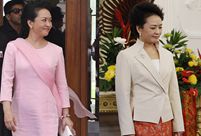 Bikini show in 2014 China Final of Miss Tourism World
Bikini show in 2014 China Final of Miss Tourism World
 Close-up view of August Aerobatic Team
Close-up view of August Aerobatic Team
 Goddesses married in 2014
Goddesses married in 2014
 Polar region photos raise worldwide awareness of global warming
Polar region photos raise worldwide awareness of global warming
 Get off at the last stop — Beijing Subway in vision
Get off at the last stop — Beijing Subway in vision
 Top 100 beauties in the world!
Top 100 beauties in the world!
 Gallery: Who is the most beautiful one?
Gallery: Who is the most beautiful one?
 If you like autumn, put your hands in the air!
If you like autumn, put your hands in the air!
 Fan Bingbing's "Queen style" in new play
Fan Bingbing's "Queen style" in new play
 Lingerie show at 2014 Miss China
Lingerie show at 2014 Miss China
BEIJING, Dec. 15 -- With his party secured a resounding victory in Sunday's lower house election, Japanese Prime Minister Shinzo Abe needs to decide how to deal with his country's alarming rightward drift, as it has increasingly become Tokyo's liability in the long run.
According to the final results of vote counting, the Liberal Democratic Party-led coalition won 325 seats in the 475-seat House of Representatives, marking an overwhelming victory that would give Abe a third term as the country's leader through 2018.
However, while revelling in the electoral bliss, the prime minister should remember that what the vote reflects is the constituency's longing for political stability, rather than their affirmation of Tokyo's increasingly nationalistic diplomatic and security agendas.
In fact, the public has been rattled by the country's chilly interactions with nearly all of its East Asian neighbors, as can be seen by this year's record low turnout.
Solely in 2014, the island country has repeatedly enraged its neighboring countries by, among others, flagrant visits of cabinet members and lawmakers to the notorious Yasukuni Shrine, and their blatant denials of the so-called "comfort women" system which forced over 20,000 foreign women into sex slavery for the Imperial Japanese Army during World War II.
Besides those provocations, Japan has also get on the region's nerves by pushing for the removal of the long-standing ban on collective self-defense in an attempt to enable the country to battle overseas and thus virtually gut the post-war pacifist constitution.
These offensive moves have frozen the political ties between Japan and its neighbors, with severe implications on the country's struggling while highly export-dependent economy.
Moreover, Japan's frequent frictions and scarce high-level exchanges with its irritated neighbors have increasingly threatened regional stability and drawn backlashes even from the United States, its major ally.
With all these consequences in sight, no wonder that Abe sought a meeting with Chinese President Xi Jinping during the APEC forum last month, after the two sides reached a four-point agreement to ease tensions.
However, achieving a rapprochement with its neighbors demands more initiative from Tokyo to be honest with its war-time atrocities, true to its pacifist Constitution, and prudent in the simmering territorial disputes.
As the volatile region is to embrace the dawn of 2015 soon, it is highly advisable and imperative that Tokyo face up to its responsibilities, shake off the rightist ideology and translate its diplomatic commitment into real actions. Now as Abe has claimed the mandate, the onus will be on him to do that.
 Beautiful Chinese woman
Beautiful Chinese woman 20 years on: Relocated Three Gorges residents through lens
20 years on: Relocated Three Gorges residents through lens PLA HK Garrison veterans leave behind beautiful smiles
PLA HK Garrison veterans leave behind beautiful smiles Chestnut girl goes viral online
Chestnut girl goes viral online Representative beauties
Representative beauties Victoria's Secret Fashion Show
Victoria's Secret Fashion Show Excellent photos of Zhuhai Air Show
Excellent photos of Zhuhai Air Show In photos: Bright and brave female soldier of PLA
In photos: Bright and brave female soldier of PLA China's charming first lady
China's charming first lady Society needs consensus on street politics
Society needs consensus on street politics Policy bank plan gets mixed reaction
Policy bank plan gets mixed reaction  Shopaholics
Shopaholics  Hungry moments
Hungry momentsDay|Week|Month